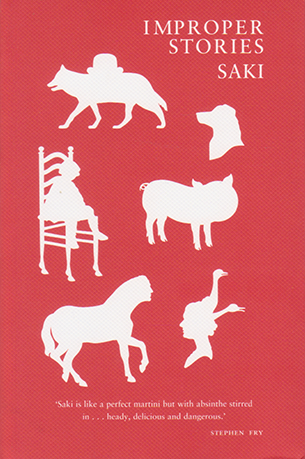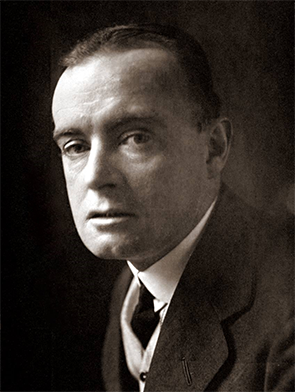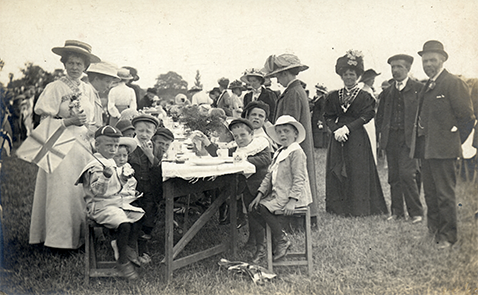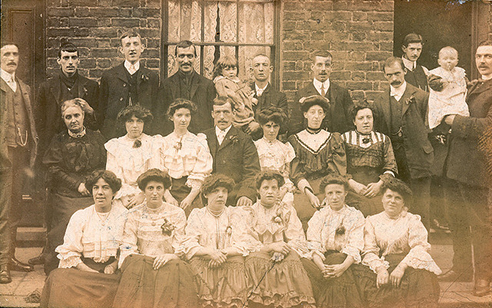It was a hot afternoon, and the railway carriage was correspondingly sultry, and the next stop was at Templecombe, nearly an hour ahead. The occupants of the carriage were a small girl, and a smaller girl, and a small boy. An aunt belonging to the children occupied one corner seat, and the further corner seat on the opposite side was occupied by a bachelor who was a stranger to their party, but the small girls and the small boy emphatically occupied the compartment. Both the aunt and the children were conversational in a limited, persistent way, reminding one of the attentions of a housefly that refuses to be discouraged. Most of the aunt’s remarks seemed to begin with “Don’t,” and nearly all of the children’s remarks began with “Why?” The bachelor said nothing out loud. “Don’t, Cyril, don’t,” exclaimed the aunt, as the small boy began smacking the cushions of the seat, producing a cloud of dust at each blow.
“Come and look out of the window,” she added.
The child moved reluctantly to the window. “Why are those sheep being driven out of that field?” he asked.
“I expect they are being driven to another field where there is more grass,” said the aunt weakly.
“But there is lots of grass in that field,” protested the boy; “there’s nothing else but grass there. Aunt, there’s lots of grass in that field.”
“Perhaps the grass in the other field is better,” suggested the aunt fatuously.
“Why is it better?” came the swift, inevitable question.
“Oh, look at those cows!” exclaimed the aunt. Nearly every field along the line had contained cows or bullocks, but she spoke as though she were drawing attention to a rarity.
“Why is the grass in the other field better?” persisted Cyril.
The frown on the bachelor’s face was deepening to a scowl. He was a hard, unsympathetic man, the aunt decided in her mind. She was utterly unable to come to any satisfactory decision about the grass in the other field.
The smaller girl created a diversion by beginning to recite “On the Road to Mandalay.” She only knew the first line, but she put her limited knowledge to the fullest possible use. She repeated the line over and over again in a dreamy but resolute and very audible voice; it seemed to the bachelor as though some one had had a bet with her that she could not repeat the line aloud two thousand times without stopping. Whoever it was who had made the wager was likely to lose his bet.
“Come over here and listen to a story,” said the aunt, when the bachelor had looked twice at her and once at the communication cord.
The children moved listlessly towards the aunt’s end of the carriage. Evidently her reputation as a story-teller did not rank high in their estimation.
In a low, confidential voice, interrupted at frequent intervals by loud, petulant questionings from her listeners, she began an unenterprising and deplorably uninteresting story about a little girl who was good, and made friends with every one on account of her goodness, and was finally saved from a mad bull by a number of rescuers who admired her moral character.
“Wouldn’t they have saved her if she hadn’t been good?” demanded the bigger of the small girls. It was exactly the question that the bachelor had wanted to ask.
“Well, yes,” admitted the aunt lamely, “but I don’t think they would have run quite so fast to her help if they had not liked her so much.”
“It’s the stupidest story I’ve ever heard,” said the bigger of the small girls, with immense conviction.
“I didn’t listen after the first bit, it was so stupid,” said Cyril.
The smaller girl made no actual comment on the story, but she had long ago recommenced a murmured repetition of her favourite line.
“You don’t seem to be a success as a story-teller,” said the bachelor suddenly from his corner.
The aunt bristled in instant defence at this unexpected attack.
“It’s a very difficult thing to tell stories that children can both understand and appreciate,” she said stiffly.
“I don’t agree with you,” said the bachelor.
“Perhaps you would like to tell them a story,” was the aunt’s retort.
“Tell us a story,” demanded the bigger of the small girls.
“Once upon a time,” began the bachelor, “there was a little girl called Bertha, who was extraordinarily good.”
The children’s momentarily-aroused interest began at once to flicker; all stories seemed dreadfully alike, no matter who told them.
“She did all that she was told, she was always truthful, she kept her clothes clean, ate milk puddings as though they were jam tarts, learned her lessons perfectly, and was polite in her manners.”
“Was she pretty?” asked the bigger of the small girls.
“Not as pretty as any of you,” said the bachelor, “but she was horribly good.”
There was a wave of reaction in favour of the story; the word horrible in connection with goodness was a novelty that commended itself. It seemed to introduce a ring of truth that was absent from the aunt’s tales of infant life.
“She was so good,” continued the bachelor, “that she won several medals for goodness, which she always wore, pinned on to her dress. There was a medal for obedience, another medal for punctuality, and a third for good behaviour. They were large metal medals and they clicked against one another as she walked. No other child in the town where she lived had as many as three medals, so everybody knew that she must be an extra good child.”
“Horribly good,” quoted Cyril.
“Everybody talked about her goodness, and the Prince of the country got to hear about it, and he said that as she was so very good she might be allowed once a week to walk in his park, which was just outside the town. It was a beautiful park, and no children were ever allowed in it, so it was a great honour for Bertha to be allowed to go there.”
“Were there any sheep in the park?” demanded Cyril.
“No;” said the bachelor, “there were no sheep.”
“Why weren’t there any sheep?” came the inevitable question arising out of that answer.
The aunt permitted herself a smile, which might almost have been described as a grin.
“There were no sheep in the park,” said the bachelor, “because the Prince’s mother had once had a dream that her son would either be killed by a sheep or else by a clock falling on him. For that reason the Prince never kept a sheep in his park or a clock in his palace.”
The aunt suppressed a gasp of admiration.
“Was the Prince killed by a sheep or by a clock?” asked Cyril.
“He is still alive, so we can’t tell whether the dream will come true,” said the bachelor unconcernedly; “anyway, there were no sheep in the park, but there were lots of little pigs running all over the place.”
“What colour were they?”
“Black with white faces, white with black spots, black all over, grey with white patches, and some were white all over.”
The story-teller paused to let a full idea of the park’s treasures sink into the children’s imaginations; then he resumed:
“Bertha was rather sorry to find that there were no flowers in the park. She had promised her aunts, with tears in her eyes, that she would not pick any of the kind Prince’s flowers, and she had meant to keep her promise, so of course it made her feel silly to find that there were no flowers to pick.”
“Why weren’t there any flowers?”
“Because the pigs had eaten them all,” said the bachelor promptly. “The gardeners had told the Prince that you couldn’t have pigs and flowers, so he decided to have pigs and no flowers.”
There was a murmur of approval at the excellence of the Prince’s decision; so many people would have decided the other way.
“There were lots of other delightful things in the park. There were ponds with gold and blue and green fish in them, and trees with beautiful parrots that said clever things at a moment’s notice, and humming birds that hummed all the popular tunes of the day. Bertha walked up and down and enjoyed herself immensely, and thought to herself: ‘If I were not so extraordinarily good I should not have been allowed to come into this beautiful park and enjoy all that there is to be seen in it,’ and her three medals clinked against one another as she walked and helped to remind her how very good she really was. Just then an enormous wolf came prowling into the park to see if it could catch a fat little pig for its supper.”
“What colour was it?” asked the children, amid an immediate quickening of interest.
“Mud-colour all over, with a black tongue and pale grey eyes that gleamed with unspeakable ferocity. The first thing that it saw in the park was Bertha; her pinafore was so spotlessly white and clean that it could be seen from a great distance. Bertha saw the wolf and saw that it was stealing towards her, and she began to wish that she had never been allowed to come into the park. She ran as hard as she could, and the wolf came after her with huge leaps and bounds. She managed to reach a shrubbery of myrtle bushes and she hid herself in one of the thickest of the bushes. The wolf came sniffing among the branches, its black tongue lolling out of its mouth and its pale grey eyes glaring with rage. Bertha was terribly frightened, and thought to herself: ‘If I had not been so extraordinarily good I should have been safe in the town at this moment.’ However, the scent of the myrtle was so strong that the wolf could not sniff out where Bertha was hiding, and the bushes were so thick that he might have hunted about in them for a long time without catching sight of her, so he thought he might as well go off and catch a little pig instead. Bertha was trembling very much at having the wolf prowling and sniffing so near her, and as she trembled the medal for obedience clinked against the medals for good conduct and punctuality. The wolf was just moving away when he heard the sound of the medals clinking and stopped to listen; they clinked again in a bush quite near him. He dashed into the bush, his pale grey eyes gleaming with ferocity and triumph, and dragged Bertha out and devoured her to the last morsel. All that was left of her were her shoes, bits of clothing, and the three medals for goodness.”
“Were any of the little pigs killed?”
“No, they all escaped.”
“The story began badly,” said the smaller of the small girls, “but it had a beautiful ending.”
“It is the most beautiful story that I ever heard,” said the bigger of the small girls, with immense decision.
“It is the only beautiful story I have ever heard,” said Cyril.
A dissentient opinion came from the aunt.
“A most improper story to tell to young children! You have undermined the effect of years of careful teaching.”
“At any rate,” said the bachelor, collecting his belongings preparatory to leaving the carriage, “I kept them quiet for ten minutes, which was more than you were able to do.”
“Unhappy woman!” he observed to himself as he walked down the platform of Templecombe station; “for the next six months or so those children will assail her in public with demands for an improper story!”

 RSS Feed
RSS Feed Facebook
Facebook Instagram
Instagram YouTube
YouTube Subscribe to our Newsletter
Subscribe to our Newsletter







No one has commented yet. Be the first!